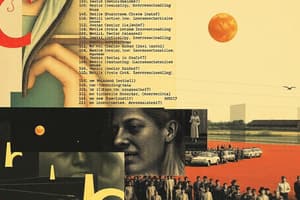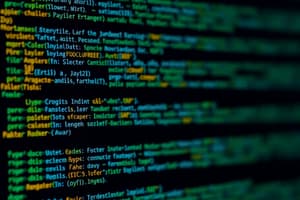Podcast
Questions and Answers
Which of the following statements about parameter passing in functions is true?
Which of the following statements about parameter passing in functions is true?
- Parameters are copied to local variables for the function upon entry. (correct)
- Multiple return statements are required to pass several variables back to the calling function.
- Parameters must always be passed by reference to be recognized in the function.
- Local variables can be accessed by the calling function after being passed as parameters.
What is the correct structure of a function definition based on the provided content?
What is the correct structure of a function definition based on the provided content?
- def func_name(parameter list): { statements }
- function func_name(parameter list) { statements; }
- func_name(parameter list) : { declarations; statements; }
- func_name(parameter list) { declarations; statements; } (correct)
Under what condition is a function prototype required?
Under what condition is a function prototype required?
- When the main function is called before any other functions.
- If the function is user-defined and not part of the standard library.
- When the function uses global variables.
- If the function is defined after its first call. (correct)
Which type of function is essential for starting the execution of an algorithm?
Which type of function is essential for starting the execution of an algorithm?
What is a key characteristic of scope rules for functions?
What is a key characteristic of scope rules for functions?
What must be true for actual arguments passed to a function with arguments and no return value?
What must be true for actual arguments passed to a function with arguments and no return value?
Which of the following statements correctly defines a user-defined function?
Which of the following statements correctly defines a user-defined function?
In the context of function definitions, what does the term 'black box' refer to?
In the context of function definitions, what does the term 'black box' refer to?
Which category of function does not involve data transfer between the calling function and the called function?
Which category of function does not involve data transfer between the calling function and the called function?
What is the default return type for a function defined without a specific type specifier?
What is the default return type for a function defined without a specific type specifier?
Flashcards
User-defined functions
User-defined functions
Self-contained blocks of code that perform a specific task.
Function
Function
A block of code performing a task, that can be called from elsewhere.
Function call
Function call
Invoking a function to execute its code.
Return statement
Return statement
Signup and view all the flashcards
Function Arguments
Function Arguments
Signup and view all the flashcards
Function with No Arguments, No Return value
Function with No Arguments, No Return value
Signup and view all the flashcards
Function with Arguments, No Return value
Function with Arguments, No Return value
Signup and view all the flashcards
Function with No Arguments, Return Value
Function with No Arguments, Return Value
Signup and view all the flashcards
Function with Arguments, Return Value
Function with Arguments, Return Value
Signup and view all the flashcards
Function
Function
Signup and view all the flashcards
Function Definition
Function Definition
Signup and view all the flashcards
Function Header
Function Header
Signup and view all the flashcards
Function Prototype
Function Prototype
Signup and view all the flashcards
Function Call
Function Call
Signup and view all the flashcards
Local Variables
Local Variables
Signup and view all the flashcards
Return Statement
Return Statement
Signup and view all the flashcards
Parameter List
Parameter List
Signup and view all the flashcards
User Defined Functions
User Defined Functions
Signup and view all the flashcards
Main Function
Main Function
Signup and view all the flashcards
Study Notes
Functions
- A function is a self-contained program segment that performs specific tasks.
- Functions help make programs modular.
- Functions can be reused in different parts of a program.
- Functions are easier to debug and modify.
Advantages of functions
- Make programs modular
- Structured programming
- Easier to debug algorithms
- Easier code modification
- Reusable in other algorithms
Function Definition
function_name(parameter_list)is the function header{and}define the function body- Declarations inside the body declare variables used within the function
- Statements inside the body define the actions or tasks the function performs
return (expression)returns a value from the function
Function Prototypes
- If a function isn't defined before use, declare it by specifying its return type and parameter types.
- If all functions are defined before use, no prototypes are necessary.
main()is the last function (often) in an algorithm.
Scope Rules for Functions
- Variables declared inside a function are local to that function.
- Other functions can't directly access these variables.
- Variables are passed to functions as parameters.
- Variables are returned from a function via a return statement.
Function Calls
- When a function is called, expressions in its parameter list are evaluated.
- Resulting values are converted to the correct data type for the function.
- Parameters are copied to local variables within the function.
- The function's body executes.
- When a
returnstatement is encountered, the function terminates. - The value specified in the
returnstatement is passed to the calling function (likemain).
Types of Functions
- User-defined functions
- Standard library functions
User-Defined Functions
- Every algorithm must have a
mainfunction to define its start. - Large algorithms can be problematic if only using
main(). - Dividing the algorithm into smaller functions (called functional parts) makes debugging, testing, and maintenance easier.
- Repeated calculations can be written as functions for reusability.
Another approach
- Design a function that can be called and used whenever needed, avoiding redundant code.
Function as a black box
- A function is a self-contained block of code that performs a specific task.
- Once created, a function can be treated as a "black box" that takes input from the main algorithm and returns a value.
Return Statement
- The
returnstatement is the mechanism for returning a value to the calling function. - By default, functions return an integer value.
- Type specifiers in the function header let functions return other data types.
Calling function
- A function can be called by using its name in a statement.
Categories of functions
- Functions can be categorized by whether they take arguments, whether they return values.
- Different types have different roles in programming.
Parameter Passing Techniques
- Call by Value: The process of passing the actual value of variables; the function receives a copy not the original.
- Call by Reference: The function receives the address of the variable; changes made inside the function affect the original variable.
Studying That Suits You
Use AI to generate personalized quizzes and flashcards to suit your learning preferences.




